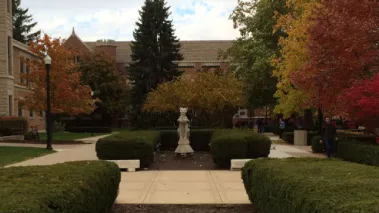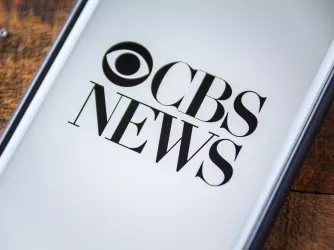Table of Contents
Northern Illinois U. Blocks Access to ‘Unethical’ Websites

Northern Illinois University (NIU) has enacted a stunningly restrictive network use policy and is enforcing it through a filter that blocks or tags websites based on content—including speech clearly protected by the First Amendment.
NIU’s policy is in the news after one NIU student posted to Reddit a “Web Page Access Warning” he received while trying to visit the Wikipedia page about the Westboro Baptist Church from his dorm room. Betabeat reported on this and other student experiences with the filter, criticizing the public university for blocking access to a wide range of online expression.
The warning received by the Reddit user categorizes the Westboro Baptist Church’s Wikipedia page as “Illegal or Unethical.” While the warning appears to allow the student to click through to view the page, it notes that the URL the student is trying to access “has been recorded for review” and ominously states that “[u]nless you are accessing this site for legitimate business purposes, it is highly probable that the access would violate the Northern Illinois Acceptable Use Policy.” Betabeat reports that other websites are permanently blocked to NIU students.
Whether students are prohibited from visiting a website altogether or simply greeted by this bizarre threat of punishment, NIU’s enforcement of its policy is an egregious act of censorship.
NIU’s Acceptable Use Policy, enacted on July 25, states, in part:
Examples of unacceptable uses include, but are not limited to, the following:
[...]
Using the resources for political activities, including organizing or participating in any political meeting, rally, demonstration, soliciting contributions or votes, distributing material, surveying or polling for information connected to a political campaign, completing political surveys or polling information, and any other activities prohibited under the ethics act and/or other state/federal laws.
[...]
Use of personal social media sites, following specific direction to cease or not utilize university equipment or time to an extent or during time periods that would interfere with professional responsibilities, including, but not limited to, Facebook, Twitter, Flickr, Pinterest, LinkedIn, Foursquare, etc., unless associated with professional responsibilities.
According to Betabeat, students have been unable to access social media sites, despite the implication that those sites should be available for “professional responsibilities”—whatever that means. Combined with the notice about “business purposes,” this restriction suggests that NIU is using a filter system intended for a large business corporation rather than for a public institution of higher education. While a corporation like Ford or General Electric might have valid reasons for limiting Internet access to some sites (for instance, to promote employee productivity), there’s a vast—and obvious—difference between private employees and public college students. The fact that the Reddit user who relayed his experience with the Internet filter was simply trying to access information about the Westboro Baptist Church (WBC) paints a disturbing picture about the breadth of NIU’s censorship efforts. It seems that NIU students who want to use the Internet to find out why the WBC is so controversial are simply out of luck.
NIU’s policy says that “[i]nformation technology resources are provided by the university to further the university's mission of research, instruction, and public service.” But NIU is creating barriers not just to websites advocating “illegal” or “unethical” activities (the vast majority of which are likely protected under the 1969 Supreme Court decision of Brandenburg v. Ohio, anyway) but also to websites sharing information about people or groups whom the university apparently believes do “unethical” things. How could this possibly further the university’s mission of educating its students? History is filled with examples of people doing illegal or unethical things, and many of those examples could contribute to students’ education about various subjects.
Beyond that, politically oriented websites and social media are integral parts of the “marketplace of ideas” that universities are meant to be. Students matriculating at NIU have no doubt come to campus expecting to have unfettered access to new ideas and a wealth of information. NIU’s policy, however, chills or precludes basic research—never mind the more controversial ideas that students should be seeking out as they hone their critical thinking and debating skills.
Making things worse, the policy states that “[i]f illicit activity of any kind is suspected as a result of routine monitoring, an internal or external investigation may result.” It is unclear how NIU is performing this “routine monitoring,” but this provision will likely discourage students from even trying to access certain types of websites. Students and other network users are left to guess as to what may trigger an investigation or punishment, particularly given that “unacceptable uses include, but are not limited to” the uses enumerated in the policy. (Emphasis mine.)
The policy continues on to state that “[a]cceptable use of NIU information technology resources is based on common sense, decency, ethical use, civility, and security applied to the computing environment.” FIRE has addressed the problem with mandating civility before. Unfortunately, some institutions simply don’t understand why demanding that no one say mean things to each other violates basic principles of free speech. NIU’s policy is especially laughable because it seems to require not only that students be civil to each other online, but also that any and all content on the Internet itself be “civil.”
NIU may believe its Acceptable Use Policy is based on “common sense,” but imposing subjective, content-based restrictions on its students’ use of the internet demonstrates that it’s anything but.
FIRE is looking into the situation and will update readers here on Newsdesk.
Recent Articles
FIRE’s award-winning Newsdesk covers the free speech news you need to stay informed.

The FCC's show trial against CBS is a political power play

UPDATE: Another federal appeals court backs academic free speech for public employees

Feds to Columbia: ‘You want $400 million in contracts back? Do this (or else)’
